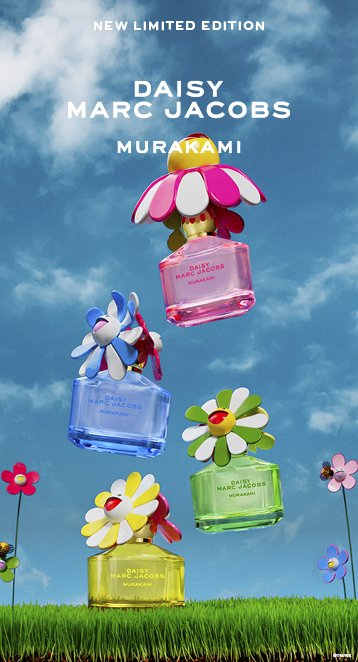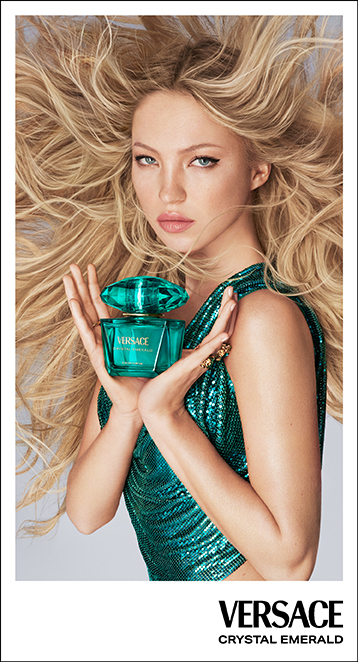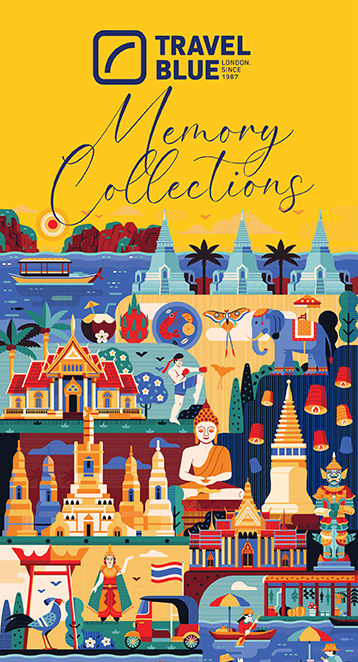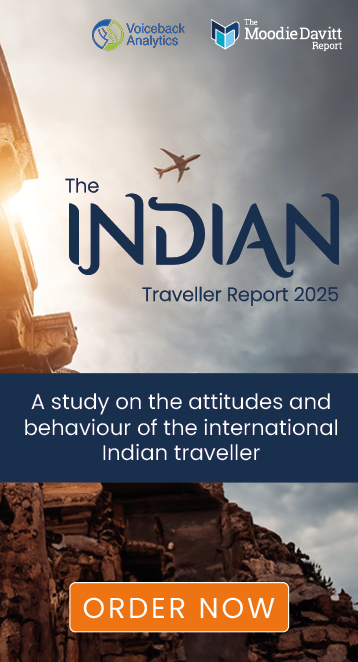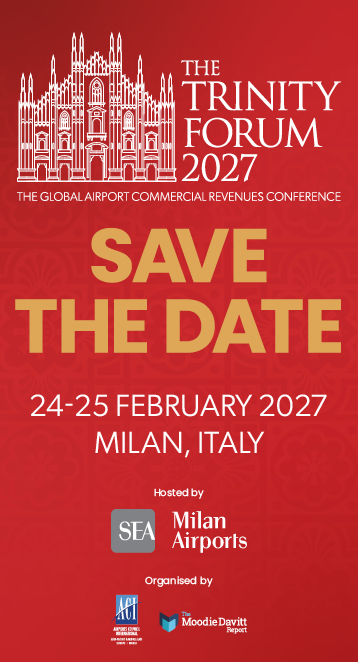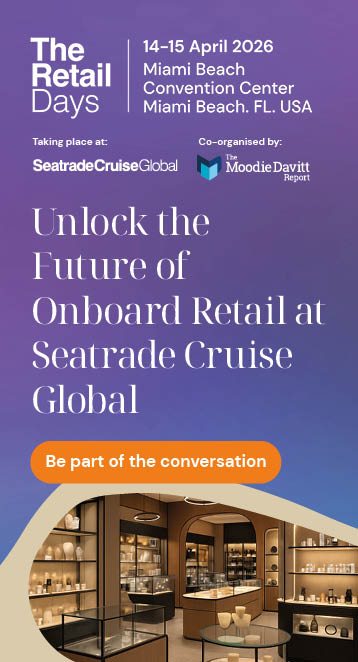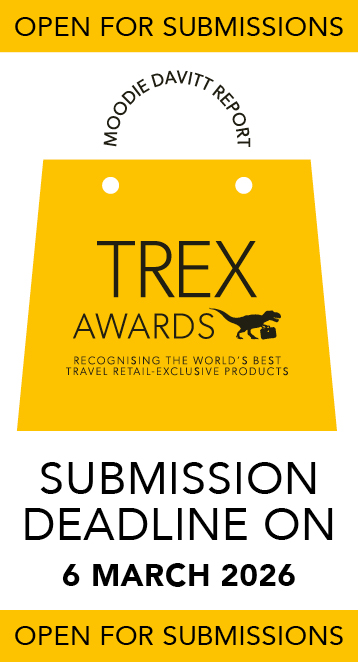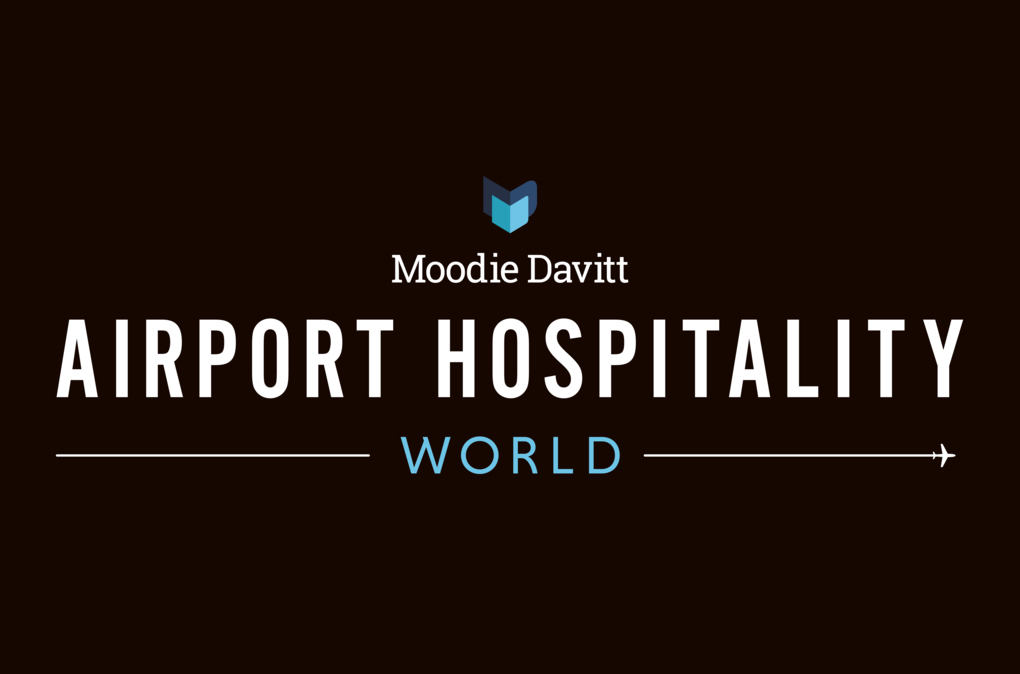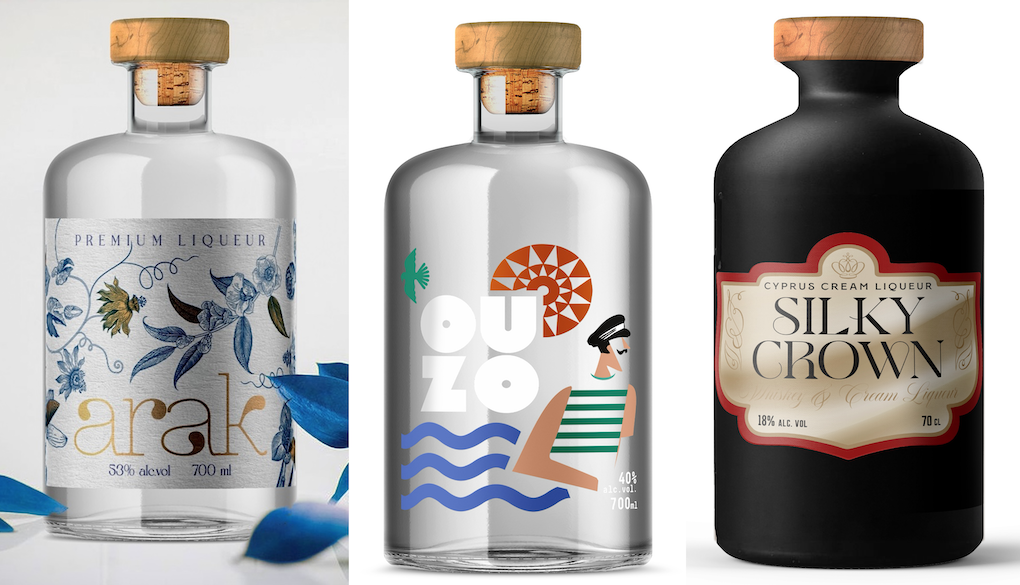The desire for beauty is a universal aspiration that transcends time, borders and cultures. Beauty, far more than appearance, is a quest that shapes our identity individually and collectively. From Homo erectus to the Metaverse, no human culture has existed without cosmetics. – The Essentiality of Beauty, L’Oréal Groupe
Prologue: It’s not every day in the beauty industry you meet an executive who is an anthropologist by background. Let alone one who sees herself as storyteller, researcher and historian all in one, a passionate advocate of an inclusive world and a champion of beauty as an essential concept that reaches far beyond the superficial and the cosmetic.
Meet the remarkable Blanca Juti, Chief Corporate Affairs and Engagement Officer at L’Oréal Groupe. Born in Mexico and now a dual Mexican/Finnish national, she is fluent in five languages (Spanish, French, Italian, Finnish and English) and conversational in Norwegian, Swedish and Dutch.
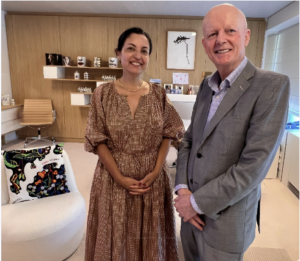
Armed with triple degrees from Cambridge University in Social Anthropology, Philosophy (History) and Literature (a Ph.D.), and an MBA from Dallas University, Juti had carved out a stellar 25-year career in leadership roles within the technology (Nokia), gaming (Rovio Entertainment) and brewing sectors (Heineken) prior to joining L’Oréal Groupe in April 2021.
The Moodie Davitt Report Founder & Chairman Martin Moodie caught up with her at the French beauty products house’s Paris headquarters recently. What resulted is a conversation that delves deep into the meaning of beauty, its essentiality, and its evolving role in society as a universal human need.
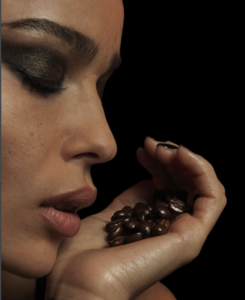
Via a combination of research-based insights and fascinating anecdotes, Juti, a passionate advocate of sustainability, human rights, and governance, explores L’Oréal’s role in shifting the narrative from exclusive to inclusive beauty.
She shares the impact of beauty in various life situations, from deeply personal moments to societal reintegration, reinforcing the idea that beauty is an essential part of all life journeys.
Blanca Juti remembers vividly her immediate reaction after being offered the plum post as L’Oréal Groupe Chief Corporate Affairs and Engagement Officer.
“My husband Riku is a philosopher. I went to see him, and I was thinking, ‘Should I really look into this industry?’ The key question I asked myself was, ‘Does the world need another lipstick?’
“Of course, as an anthropologist, I know the world does need another lipstick. It is actually an essential human need. But I still asked myself, is it relevant? And as I was having this lovely lunch with Riku, I realised that aside from climate change – which is our biggest challenge because it puts human existence in peril – of the next biggest challenges we have, the majority are around inclusion.
“It’s about people feeling that they are not accepted or not tolerated. It’s about structural changes between the rich and the poor, and #MeToo and LGTBQ, and the Gilets Jaunes (the ‘Yellow Vests’ protesters in France). These are all about inclusion, all about intolerance.
“L’Oréal is the fourth-largest advertiser in the world, and we produce products for every type of hair, every type of skin. If we can create an inclusive world where every beauty has its place, we have a very strong role to play in society, and our existence depends on this role.”
It’s a powerful, all-embracing notion of beauty, a far cry from the superficiality that multiple sectors of the industry have historically conveyed. “If we were not to understand that our role is to provide beauty for each and beauty for all, we would be irrelevant,” says Juti, warming to her theme.
“At the same time, society has the same need. I find that when society and corporations have common needs, you can really get into a very virtuous cycle and drive things forward. So that’s what we’re doing here. As you know, our purpose is to ‘Create the beauty that moves the world’.
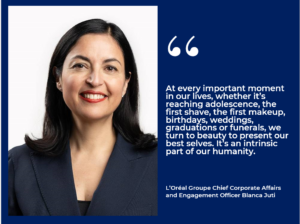
“It’s not just about beauty for the sake of beauty, but making sure it’s a beauty that is inclusive, that brings confidence to people. It’s a beauty that is responsible to the planet. It’s a beauty that is responsible to society. It’s a beauty that is generous. That’s the whole ambition.”
The rapid-fire repetition of the words reinforces their power. But isn’t the concept of beauty also exclusive in that traditional or common perceptions – particularly as relayed through advertising – often make some seem beautiful and others not?
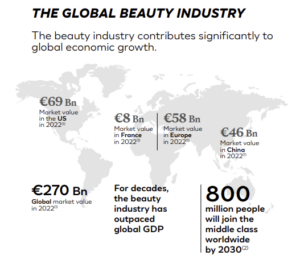
“Absolutely, and I think beauty used to be exclusive. These were the standards of beauty,” Juti replies candidly. “I strongly believe that our role is to demonstrate that beauty is everywhere. Our aim is to break the perception that beauty is exclusive. I think that with beauty, with AI, with technology and in life, you need to understand both the darker and lighter sides to choose the right path.
“It’s when you understand life’s complexities that you can focus on the right thing. There’s a word that I love – and we use it internally here – which is ‘cosmethics’. It’s about the ethics of cosmetics. For me, it’s that sense of responsibility I talked about earlier. It’s about the human journey we’re here for.”
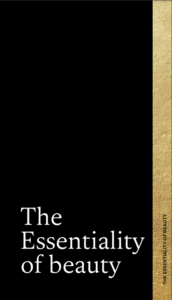 A few weeks after our meeting in Paris, L’Oréal released a 67-page manifesto called ‘The Essentiality of Beauty’, a fascinatingly complex and thoughtful walk through the history, meaning and future of beauty.
A few weeks after our meeting in Paris, L’Oréal released a 67-page manifesto called ‘The Essentiality of Beauty’, a fascinatingly complex and thoughtful walk through the history, meaning and future of beauty.
“Let me tell you what I mean when we talk about the Essentiality of Beauty,” Juti explains. “People think that beauty is superficial and attribute it to non-essential needs, something that’s irrelevant. Often, it’s more associated with the feminine than the masculine and with youth rather than old age. However, if you think about it, we start our lives and end our lives with a beauty ritual…”
The pause is deliberate and hangs in the air. The clarifying question is on my lips but the expression on Juti’s face tells me the answer is coming, the storyteller now in full flow.
“… Our first and last baths. We begin and end our days with a beauty ritual where we face ourselves on the other side of the mirror and we pause time to see ourselves. At every important moment in our lives, whether it’s reaching adolescence, the first shave, the first makeup, birthdays, weddings, graduations or funerals, we turn to beauty to present our best selves. It’s an intrinsic part of our humanity.
“Every culture and time period has lived with and required beauty. Beauty is an individual act of identity. It’s also about showing belonging, fitting in, or disrupting by presenting yourself differently. It’s an act of identity to show belonging to a group or to show your associations, your identity.
“So it is both individual and collective. The moment you distance yourself from beauty or choose not to look after yourself, you’re disconnecting from society.”
Beauty and the journey to self-confidence
To that point, L’Oréal Groupe works closely with organisations that help people reconnect with and reintegrate into society, notably Emmaus in France, which assists vulnerable people living in precarious conditions.
“With Emmaus, we have beauty spots where people can be groomed and receive products. The head of Emmaus told me that in the journey to return to society, beauty plays a vital role. He said, ‘If you see someone living on the streets and give them the keys to a flat, they often lack the self-confidence to use it.’
“This journey to build self-confidence, to understand one’s worth and appreciate it is crucial for them to return. It’s essential for both men and women, in situations like illness or prison where our integrity or our sense of self is challenged – like being a cancer patient. It’s a moment of humanity, of reinstating one’s humanity.
“So it is a deep human need. It’s not superficial – it’s way more than skin deep. We might think beauty superficial, and some elements might be, but its entirety is not. There’s a real need – it’s connected to wellness, confidence, and many other things.”
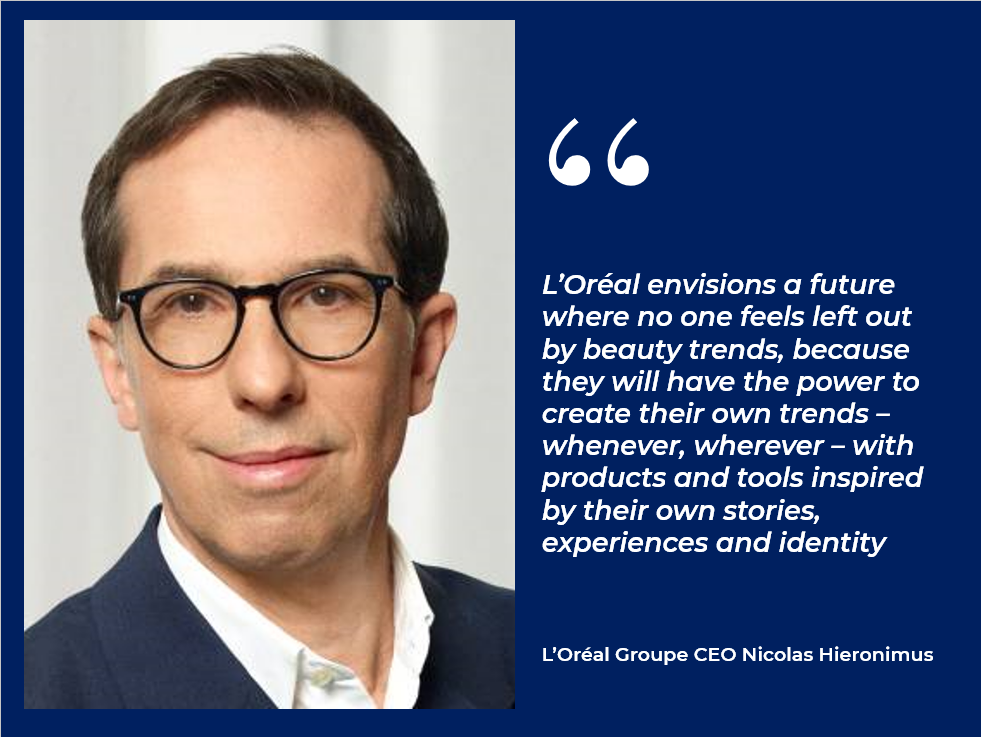
Anyone who has watched women undergoing chemotherapy in a cancer treatment room – and this writer, from his own experience with the disease, has done exactly that – will understand the assault on dignity and self-perception of beauty that the drug can bring. I tell Juti how I recall to this day witnessing a combination of defiance, humility and pride among those patients, with or without headscarves or wigs, who had lost their hair while undergoing treatment. In dignity, their beauty arguably shone more than ever.
“Beauty is a need that transcends ages and belongs to people in various stages of their lives and contexts,” Juti continues. “So, to me, it’s an essential part of our human journey. It’s a bit like that story about war and Winston Churchill, where someone questioned whether the arts are necessary, and he responded to the effect, ‘What’s the war worth fighting for if art is not necessary?’ So to me, it’s this essential need that we have, and I’m proud to work in this industry.
“It’s also an industry with a lot of innovation. I love the fact that our company covers everything from cosmetics for makeup to more medical cosmetics. We span from luxury to hair products. We have the full spectrum of beauty. We have 6,000 scientists including 2,000 tech & data experts – and more than half of them are women.
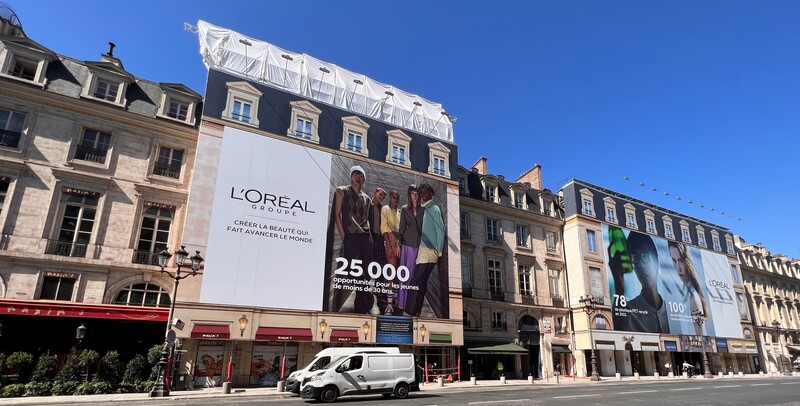
“We have scientists from various fields, including biologists, chemists, biochemists, and environmental scientists. Physics is also crucial because the science of colour is based on it. Our scientists from various backgrounds are collaborating closely with technology.
“We’re conducting numerous studies around the world, some with start-ups. For example, there’s a fantastic start-up called Clue, which focuses on understanding menstrual cycles and their impact on beauty. We also have a partnership with Breezometer, a company that provides data on weather conditions and pollution. Breezometer measures the exposome, and we’re studying its effects on the skin.
“Additionally, we’re collaborating with Verily, an Alphabet-owned company, on the largest longitudinal study of skin. We’re combining technology and science to achieve marvellous outcomes.”
Travel retail as a showcase for beauty’s values
The universality of beauty brings the conversation around to travel retail. Airports, a key component of the channel, are not just transit hubs, I suggest. They are crossroads of humanity, places that transcend, even defy, boundaries, whether they’re gender, religious, cultural, racial or socio-economic. To use Juti’s oft-quoted term, inclusive.
“Absolutely. Airports are a confluence of different cultures, a convergence of humanity. They connect people and enable learning from one another,” Juti agrees. “Today’s world is incredibly interconnected through travel and technology. The role of beauty on social media is substantial. It’s the top conversation on platforms like TikTok, primarily because it’s highly visual and aligns well with platforms like TikTok and Instagram.
“Younger generations are exceptionally knowledgeable about beauty, often more than experts in older generations. People born in 2000 and beyond, like my daughter, possess an impressive level of expertise. They’re well-versed in ingredients, shades, application techniques, and more. This is the result of various cultures coming together and sharing knowledge.”
I mention my Korean wife’s beauty rituals, learned from her mother who, well into her eighties, still follows an extensive beauty routine every morning and evening.
“Yes, the Korean beauty ritual is known for its multiple steps. It’s not just about applying products; it’s a ritual that allows you to pause time,” Juti comments. “It’s a moment in our fast-paced lives where, as we’ve discovered through extensive research involving sociologists, psychiatrists, historians, and anthropologists over two years, time pauses. These moments occur in the morning and evening. It’s a fascinating ritual.”
From Homo erectus to the Metaverse, no human culture or civilisation has survived without the need for beauty. According to the French paleoanthropologist Pascal Picq, “In prehistoric times, men and women had a greater hunger for beauty and symbols than they had for meat.” – The Essentiality of Beauty, L’Oréal Groupe
Understanding the Essentiality of Beauty
Over the past two years, L’Oréal Groupe has delved deeply into the question of whether beauty is superficial or essential. Perhaps not surprisingly, the research concluded overwhelmingly in the latter’s favour. But Juti insists the research was challenging, neutral and robust.
“We approached this question historically, examining the book 100,000 Years of Beauty you see there,” she says pointing to a five-volume tome on the table in front of us commissioned by L’Oréal Groupe in 2009 to celebrate its centenary. Written by 300 authors (including anthropologists, archaeologists, ethnologists, sociologists, artists, philosophers, historians, art critics, museum curators and psychiatrists) of 35 different nationalities, the work is dedicated to the human quest for beauty through the ages and across civilisations.
“Beauty has existed throughout history. I like to say that from Homo erectus to the metaverse, beauty has been a constant. Even before Homo sapiens, we found pigments used for cave art and personal adornment, expressing identity. This need has persisted through time, from birth to death, as I mentioned earlier. Beauty is a journey that starts with humanity’s origins and extends to our final rites.
The sense of smell is intimately connected to the emotional centres of the brain. As a result, fragrances play a crucial role in influencing our mental well-being in several ways. They can uplift our mood, facilitate better sleep, and contribute to our overall sense of wellness.
This significance of smell has become even more apparent during the COVID-19 pandemic, as nearly 53% of affected individuals experienced anosmia, a condition where they lost their sense of smell. This underscores just how essential the ability to smell is in our lives. – The Essentiality of Beauty, L’Oréal Groupe
“We’ve also explored beauty’s link to wellness. For the Egyptians in ancient times, fragrance was closely tied to wellness, and we know that hygiene and wellness are closely connected. During the COVID-19 pandemic, when people were confined at home and ventured out less, they used less makeup but embraced more skincare, fragrances, and skin products. The need for beauty remained constant.
“We examined different historical periods, including the role of beauty during adversity, such as illness and war. Documents reveal that women in the Baltics, Sarajevo and similar places wanted to appear feminine when they faced adversity because it empowered them. The need for beauty persists even in challenging times. We’ve also explored instances where beauty doesn’t build confidence, but can have the opposite effect. Beauty can be misused and even daunting.”
Haircare plays a critical role in our quest for self-expression and identity, bolstering self-confidence and driving personal style. Today, the haircare industry, deeply intertwined with societal trends, often leads cultural shifts and reflects evolving concepts of beauty. – The Essentiality of Beauty, L’Oréal Groupe
Historically, much traditional beauty advertising has been stereotypical and therefore by implication daunting to many, I suggest. “Absolutely, it was often exclusive. Our role is to challenge this and demonstrate that beauty exists everywhere,” Juti responds.
“In our product design, we create products for every skin and hair type. Inclusion isn’t just about diversity in our workforce; it’s about having products that cater to everyone. It’s about celebrating each type and addressing the specific needs of every individual.
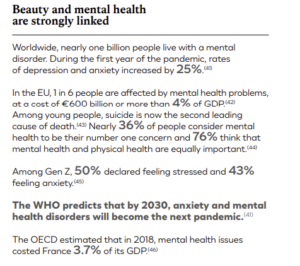
Responding to human evolution
“The types of products are evolving. For instance, something like 40% of the world will have curly hair by 2030. L’Oréal is working on this, to develop hair products for all hair types and celebrate each type, for example with Kérastase, which has developed an entire range dedicated to curly hair. Curly hair, for example, requires more care and specific products. For us, it’s about product development, advertising, and how we present ourselves to the world. It’s a comprehensive approach deeply embedded in our identity.”
Makeup has been an essential human need across diverse cultures and historical periods. From the Paleolithic era to modern times, people have adorned themselves with makeup and ornaments as a tool for self-expression and distinction. The first recorded pigment, ochre, which was used as a cosmetic, dates back some 350,000 years. – The Essentiality of Beauty, L’Oréal Groupe
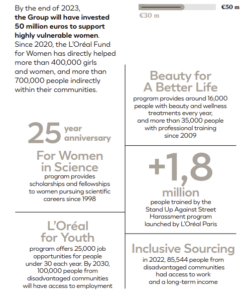
This is fascinating territory, as much about human evolution as it is about the temporariness of trends. Which leads us unto the role of colour cosmetics.
“We’re doing a lot of studies on skin and all the diverse colours that there are. With Le Teint Particulier from Lancôme, we have foundations adaptable to 22,000 colour types
“We want everyone to feel valued. These names relate to the scientific perception of colour depth and related factors instead of using traditional names.”
Did the pandemic fundamentally influence this shift in focus? “No, I had already been contemplating whether beauty is essential before the pandemic,” Juti responds. “What you have here [in The Essentiality of Beauty] is a result of our extensive internal study, which I produced. It explores the aspects we discussed.
Beauty shapes collective and individual identities, revealing culture, time, age, gender, and social groups, producing aesthetic rules and preferences that inform visual language.– The Essentiality of Beauty, L’Oréal Groupe
“My aim is to highlight that the beauty industry is not a trivial one. Many people underestimate its size, technology, innovation, and socio-economic impact. When people think of industries, they often consider airplanes and electric cars. Yet, the beauty industry is colossal, amounting to US$270 billion. I have data for the beauty industry as a whole, as well as for makeup, hair, and various other segments.”
Over the course of an hour’s discourse, I am seeing the beauty industry entirely differently, the anthropologist’s perspective illuminating and perception-changing.
“I love it,” says Juti of her work. “For me, it’s about understanding the force beauty possesses. When you see how it dominates conversations on social media, that is clear evidence of beauty’s significance for humans. It’s something we genuinely require. There are elements of health, wellness, identity building and even creativity to it. It’s a complex and all-encompassing industry.”

Has L’Oréal conducted any studies on the origin of the concept of beauty? Indeed of the genesis and semantics of the words beauty and beautiful?
“Yes, indeed, we’ve explored it,” Juti replies. “It’s fascinating because the term ‘beauty’ has evolved over time. In our book, you can see that 1.7 million years ago the quest for beauty began, and 350,000 years ago natural pigments were already being used for beauty.
“In our world map, we’ve associated words with various languages. For example, in Finnish ‘kauneus’ – meaning beauty – is linked to speed, a strong, fast force. In German, ‘schönheit’ is related to worth, shine, and light.
“These associations tend to be positive in every language, and they delve deeper into qualities rather than superficiality. In the Navajo language, beauty is associated with harmony, while in Chippewa and Mexico’s Nahuatl, it’s linked to purification. The word ‘beauty’ often carries positive traits and implies depth rather than superficiality.”
An act of love
Our conversation – for that is what this is, rather than an interview – takes a personal turn. I mention my late mother – Mary Moodie, famed as ‘the mother of foster care’ in my native New Zealand. Visiting her from my then-UK base before her cancer-riddled death but having to say goodbye before she passed, I searched in vain for the right words to say to her. Then I chanced on a poem by Kiwi poet James K. Baxter, who wrote:
Your face wears the mask of age,
As a warrior his moko {tattoo}
Double the beauty,
A soul like the great albatross
I included those words in my final farewell card to her. In her dying weeks, as the condition took hold, she retained a beauty , albeit of a different kind. That word dignity again.
“My mother also passed away, and as you shared your story, I thought about her,” Juti responds. “She visited her hairdresser just a few days before her passing to have her hair done. I was with her, and it was a poignant farewell.
“She told her hairdresser about her condition in a way she probably couldn’t with her friends. This hairdresser had been tending to her for 40 years, and it was a deeply moving farewell. It made me think a lot about the role of caretakers, especially hairdressers, because when you help someone with their hair or appearance, it’s an act of love. You’re touching someone, entering their personal space. This illustrates the essentiality of this business.
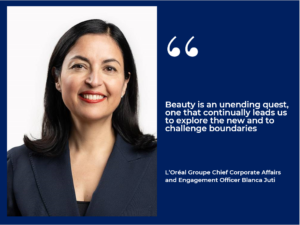
“Surprisingly, in France, there are more beauty salons than bakeries. It’s one of the last things that can’t be fully replaced online. While you can do your banking online, you visit a hairdresser or aesthetician because you value that human touch and connection. This is another dimension to consider: beauty advisers and hairstylists establish strong human connections. In hospitals, they play a significant role in the recovery process, as you mentioned.”
What of the role of beauty advisers, cast in their daily role as engagers, educators and, ultimately, salespeople? Where do they fit in in terms of the articulation of beauty?
“If you think about it, a beauty advisor not only enhances your appearance but also helps you see what you might overlook about yourself,” Juti observes. “They’ll tell you that you’re truly beautiful and suggest ways to highlight your features or assist you. It’s a moment that boosts your confidence and contributes to your wellbeing. Beauty advisors play a vital role in this regard.”
Inclusion and reinvention
I cite the words of L’Oréal Groupe CEO Nicolas Hieronimus from an earnings call in 2022 when he mentioned this was a pivotal period for the beauty industry, contending it was transforming into something different. Is this desire to emphasise beauty as a deeper, more fundamental notion driving that change?
“Yes, we refined our manifesto or mission a few years ago, which is ‘Create the beauty that moves the world’,” Juti replies. “This manifesto strongly revolves around beauty for everyone, beauty that instils confidence, beauty for each individual on the planet, responsible beauty, and generous beauty. When we evaluate our success at L’Oreal, we don’t only consider financial success; we also assess our positive impact.
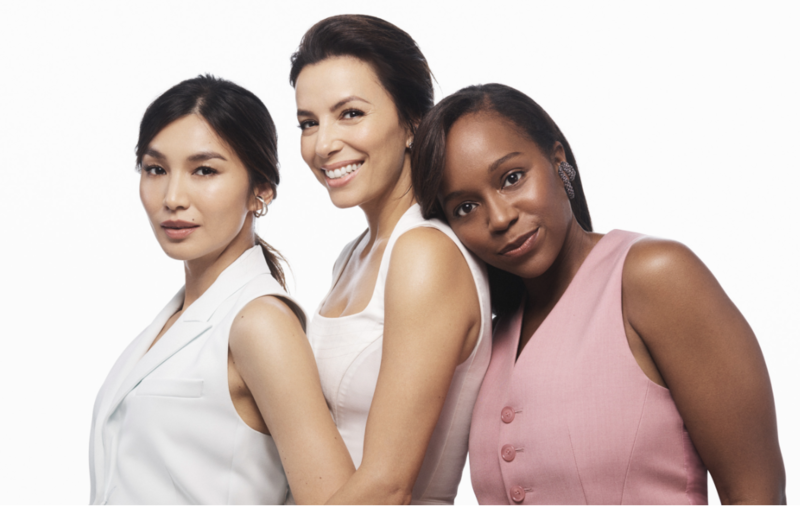
“We ask questions like, should we create a fund to address the role of women in changing climatic conditions? Or should we run a solidarity sourcing programme where we work with partners in our supply chain who may not typically find employment? So we genuinely focus on the positive impact we can make. The industry has always been about making people feel good, and that won’t change.
“But we want to extend this focus into inclusion. Nicolas often talks about the concept of ‘Unicornus Rex’. He emphasises the idea of having the scale and heritage of an old company while remaining modern enough to reinvent ourselves and venture into new areas.
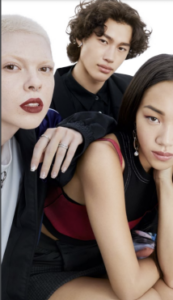
“Science and technology play a significant role. The transformation in the sciences is enormous because we are reformulating everything, transitioning to green sciences. Ultimately, our goal is for 95% of our ingredients to be naturally derived. We’re already at over 66%, so we’re progressing rapidly.
“To achieve that 95%, we need to ensure these products are as effective and high-performing as their non-green counterparts. This involves using new technologies and adopting innovative approaches, such as lateral farming and lab-grown algae.”
Skincare rituals have evolved throughout history, reflecting the cultural narratives of beauty, wellness, and self-care. In recent times, the significance of skincare routines has grown, particularly during and after the COVID-19 pandemic. These rituals not only help maintain physical health and wellbeing, but also serve as a vital tool for mental health, offering stability and structure during challenging times. – The Essentiality of Beauty, L’Oréal Groupe
This compelling sojourn of a conversation moves finally to skin tone. I mention that just a few decades ago people with pale skin would curse their inability to tan. Now, increasingly, both the beauty of such a tone – and the dangers of trying to change it – are widely recognised.
“Every type of skin deserves appreciation, and the sunscreens are incredibly advanced technologically,” comments Juti. “We made a significant breakthrough last year with [La Roche-Posay Anthelios] UVMune 400, which provides protection against longer UV waves. Discoveries like this happen every ten to 20 years.
“We were able to achieve this partly due to our use of EpiSkin, which allows us to test our products on reconstructed human skin. This eliminates the need to test on actual humans and helps us develop and test UV products. So, a significant amount of technology is involved.”
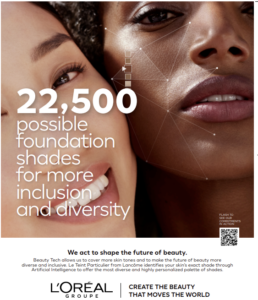
Our time is up, my mind whirring and excited as to how I will translate this enthralling discourse to page. Juti’s passion for people and culture is infectious, her curiosity about life deep-rooted. And she’s clearly entranced by her role. “Once you start working for L’Oréal, it’s almost impossible to leave and work in another industry,” she says, smiling at the thought.
“It’s the same for anyone working at L’Oréal. We have very low employee turnover. We receive numerous applications – 1.5 million this year. Our employees tend to stay for an extended duration. I believe that for individuals now over 50, the average tenure is around 28 years.
“The beauty industry is fascinating because it is linked to essentiality,” she concludes, returning to her prevalent theme. “Beauty is an unending quest, one that continually leads us to explore the new and to challenge boundaries. I adore the innovation aspect of it and its incredible diversity. To me, this is a candy store.” ✈





